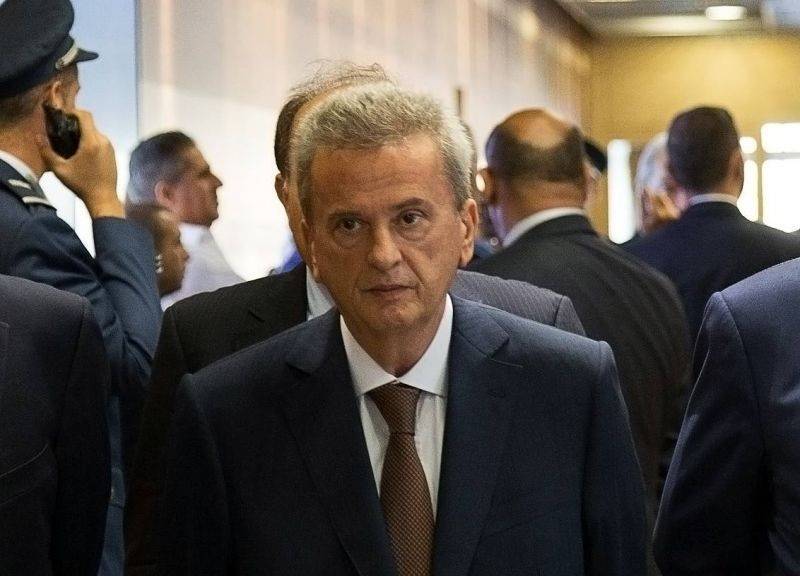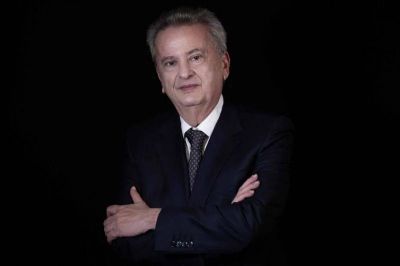
The governor of the Banque du Liban, Riad Salameh, who implicated in a Lebanese investigation and other European. (Credit: Thomas Hage Boutros/L'Orient-Le Jour)
While many observers feared that the Lebanese investigation into Banque du Liban (BDL) Governor Riad Salameh, his brother Raja, and his assistant Marianne Hoyek would impede the European investigators' inquiries into alleged malpractices, the first investigating judge in Beirut, Charbel Abu Samra, dispelled all concerns Monday.
Abu Samra replaced the previously-scheduled Lebanese investigation hearing for Wednesday with a session focused on answering the Europeans' questions.
French, Swiss, and Luxembourg investigators, who arrived in Beirut on Monday evening, will attend Wednesday's hearing and Abu Samra will pose their questions. The Europeans will be permitted to record answers and the judge investigating will be responsible for compiling a report.
Judge Abu Samra previously scheduled the hearing as part of his ongoing investigation into Salameh and his associates.
The former Deputy Prosecutor at the Court of Cassation, Jean Tannous, prepared a file regarding commissions on the sale of financial securities allegedly obtained by the brokerage company Forry Associates, in which Raja Salameh was the economic beneficiary. The file was referred to the current Deputy Prosecutor at the Beirut Court of Appeal, Raja Hamouche.
According to a senior judicial source who spoke to L'Orient-Le Jour, Judge Abu Samra changed the purpose of Wednesday's hearing because the European investigators were not notified beforehand that Abu Samra scheduled the hearing in the Lebanese investigation and had planned to arrive in Beirut on Monday.
Abu Samra received the lists of European questions, which are virtually identical and appear on three different lists drawn up by the three countries requesting mutual legal assistance, last Thursday.
According to the same source, it appears that the magistrate reviewed all questions and removed those that conflict with Lebanese laws and human rights.
The presence of the European delegation marks the second visit of international investigators to Beirut, following an earlier visit in January.
The German investigator who collected significant evidence during the previous visit is not among the investigators who arrived Monday, as that judge has been transferred to another position.
Meanwhile, Belgian authorities have not yet submitted letters rogatory to Judge Abu Samra but are instead coordinating with the European Union.
Last week, Belgian magistrates visited the first investigating judge and the Cassation Prosecutor's Office as part of this effort, according to the same source who did not elaborate further.
The Salameh brothers and Marianne Hoyek have yet to appear in court, but the BDL governor reportedly intends to appear Wednesday, according to the Al-Jadeed television channel.
Two scenarios are possible: either they do not show up in court and new summons will be issued, or their lawyers would submit procedural exceptions to the judge, or request more time to submit them.
In the latter scenario, the European inquiry would likely be delayed since the judge would need to rule on the objections, and any decision made by the judge would be open to appeal.
It was reported Monday that the head of the lawsuit department at the Justice Ministry, Helene Iskandar, is contemplating filing a complaint against Riad Salameh, according to a reliable source who spoke to L'Orient-Le Jour.
Iskandar intends to attach the complaint to the ongoing investigation by Judge Abu Samra. She sent a request asking him to notify her of the planned hearing and authorize her attendance as a representative of the State. However, Abu Samra has yet to respond to her request.
Beyond the judicial framework
According to some observers, the investigation initiated by Judge Abu Samra could potentially delay the mutual legal assistance requested by the European justices, as stated in Article 46, Paragraph 26 of the UN Convention Against Corruption. This article allows the requested state — in this case, Lebanon — to postpone assistance if it hinders internal investigations being conducted on its own territory.
To date, Judge Abu Samra has not only refrained from delaying European assistance, but he prioritized the European investigation over his own.
Paul Morcos, the director of Justicia, a Beirut-based legal firm, suggests that, although the judge is presently cooperating with the European judicial system, he retains the option to activate Article 46, Paragraph 25 at any point.
“To date, [the judge] has probably not identified an incompatibility between the Lebanese and foreign files. However, in light of his investigation, [Abu Samra] could later decide that the two files are in contradiction and therefore suspend his assistance,” Morcos told L’Orient-Le Jour.
“The principle is that cooperation between signatory states should be the norm, while non-assistance should be the exception,” Morcos stated, adding that “the judge in the requested state can, but is not obligated to, delay the requested assistance.”
According to a lawyer who requested anonymity, the issue extends beyond the purely technical and judicial framework.
“The case is delicate, given that it involves serious accusations of crimes such as embezzlement, money laundering, or illicit enrichment against one of the highest public officials,” the lawyer explained.
“This case is much more a matter of political decision by the state.”
This article was originally published in French in L'Orient-Le Jour. Translation by Sahar Ghoussoub.

